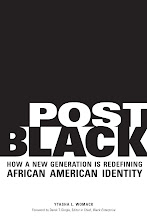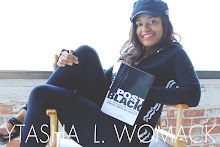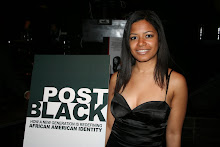Stephanie Rose Bird is author of The Big Book of Soul: The Ultimate Guide to the African American Spirit. Her body of work includes studies of African Traditional Religions (ATRs), African Derived Religions (ADRs) and earth based spirituality. She's a professional member of the American Folklore Society, the Herb Research Foundation, and the American Botanical Council.
YLW: Tell me about "Big Book of Soul." What practices do you discuss?
SRB: I talk about drumming, dancing, ecstatic dancing, singing, whistling. There are beauty rituals. I talk about African Traditional Beauty Standards. I talk about recipes for making henna. I have some Egyptian bath and foot soaps. I talk about soul food, ways to use it and the vital chemicals and nutrients that it includes. There's a lot of mythology and folklore in there.
YLW: I read about one practice that attracts lovers?
SRB: The nation sack is a type of mojo bag that women would carry in their bra and it would have oils, herbs and roots inside. So it's something good to have for Valentines Day. I talk about how to make one in the big book of soul.
YLW: Your book explores the spiritual concepts of soul and discusses African Derived practices like Hoodoo that people can incorporate in their lives today. Usually, when people talk about soul and black culture, they're referring to music.
SRB: Soul is in music. It's inexplicable. It's difficult to define. Instead I focus on earth based cultures that support soulfulness. I talk about soul nurturing practices in the African Diaspora and also of ancient cultures. I just feel it is a force that is readily available to tap into. Even in the Christian Church when people get happy and get into gospel music, they're tapping into these elements of soul.
YLW: How did you come to study earth based religions, African Traditional Religions, and African Derived Religions?
SRB: It began with me living really close to the earth . I've been involved in earth based religions since I was 13. I grew up in New Jersey on the lake front. The forest and trees were more of my friends than anything else. I connected with nature at an early age. I have one grandmother who was a spiritualist minister and herbal healer, my grandmother was psychic, and I have an uncle who is a babalewo. My grandmother was into tea leaf reading, numerology. Of course, I have a lot of family who were into traditional Christianity, too.
YLW: Why are you an advocate or these expressions of spirituality?
SRB: I hope to see African belief systems and ways of healing get equal footing with Native American, Ayurvedic, and other earth based expressions. I've written five books and four of them are centered around African earth based spirituality.
YLW: Why aren't African inspired forms of expression as well known as other forms of earth based expressions?
SRB: It's really complex. I still think that the general society looks at African religions as being dark and mysterious and dangerous. Also, I think in African American society, when you think spirituality, the first thing that comes to mind is Christianity and after that Islam. People don't think about earth based spirituality. I think the practices are dying out.
YLW: In your book you talk about Hoodoo and various practices. Did you grow up in a family that discussed and practiced Hoodoo?
SRB: Hoodoo was never really spoken about or named in my family. My family settled in New Jersey. The slave ancestry was in Virginia. But it was the practices themselves that I retained visually. It wasn't transmitted to me orally. My mother did talk about wars with neighbors or throwing dust between neighbors. My mother would throw pennies for good luck, she would burn incense to cleanse the home. She would do things that she retained from her mother. Not only did I retain her practices, but I studied them to see what they meant. I traced a lot of these practices back to Egypt. I talk a lot about Egypt and Africa in my work. Everything in our society tends to be thought of in a generalized way. I look at Continental Africa and see how it came down through the ages.
YLW: What are some common Hoodoo practices that are popular today?
SRB: Painting the bottoms of trees white. They do it in the rural South. It's associated with the spirit world. The color white is the essence of our being and it's very other worldly. There's a reverence for metal. Horseshoes, for example. We had horseshoes in our home. The metal smiths are revered in West African culture because they have transformative practices. We carry dimes with us and lucky pennies. I think some of the things that I talk about might confuse younger people. Even things I grew up with like having a lucky penny, I don't know if many kids today do. I think they're losing their way. These are practices that people don't think about anymore. Not many people have horseshoes in their home.
YLW: There does seem to be a renewed interest in earth based spirituality. For example, many people are doing celebrations to acknowledge the Winter Solstice in addition to Christmas, which is a preChristian practice.
SRB: I know what you mean. I go to a unitarian, universalist church and we talked about yule and prayed in the four directions. I was dumbfounded but it was very neat. When I first went to the temple I saw a pagan song in the hymn book. I really like this church. I told the minister that I'm pagan and he said 'welcome, we're glad to have you here.'
YLW: You identify yourself as pagan?
SRB: Pagan, meaning the older, preChristian ways. It doesn't have a negative connotation to me. Some people in my circle call themselves heathens. I'm preChristian, preIslamic in my systems and beliefs.
YLW: So you wouldn't say that you practice an African Traditional Religion?
SRB: I practice African Derived Religions.
YLW: What's the difference?
SRB: African Derived Religions include Santeria or Hoodoo. They're not African Traditional Religions, but were inspired by them and evolved in the New World. An example of an African Traditional Religion would be Yoruba. I take a lot of consideration of ATRs in my writing. They have influenced the African Derived Religions. However, I am not initiated. There are things that bother me with the initiation process in ATRs. For one, I'm an animal lover and I have a problem with sacrifice. I talk about substitutes for blood in my work, like using pomegranate juice for your rituals.
YLW: So how would you identity your spiritual practice?
SRB: I am Pagan, I practice Hoodoo and I'm a Green Witch. I'm not Wiccan. Green Witches practice magikal herbalism.
YLW: Are you spelling magical with a K?
SRB: Yes, the other spelling refers to slight of hand tricks. That's not what I do.
YLW: How did you become a Green Witch?
SRB: I did a lot of reading and I had friends when I was 13. Today, I'm called a solitary, I'm practicing alone. I do yahoo groups and meet up with different practitioners, though.
YLW: How were you introduced to it?
SRB: I think you're born a witch. I had it in me. So when my friends came out of the broom closet so to speak and said they were witches, I said alright.
YLW: You combine a variety of practices.
SRB: I am an eclectic. I collect practices. I figure why not. Tradition has it's place and I respect it. But I am not traditionalist at all. I'm in an interracial and intercultural marriage with interracial, intercultural children. I go to a unitarian church. Some witches would raise their eyebrows that I would even go into something that's called a church.
SRB: You know, as I was talking to you, I found some cobwebs. My mother used cobwebs and put them on my cousin's head and healed his concussion. He didn't have to go to a doctor or anything. That's one of the things I talk about. In the book, I talk about how over time, we had to doctor ourselves. A lot of these healing ways we had to do because white doctors didn't want to deal with us. Black women were the chief medical people on plantations, they ministered to the enslaved and the owners. They were midwives. I try to learn as much as I can about what they did as possible.
YLW: Why weren't many of these practices passed down? Today, where they are present, they're often labeled as superstitions.
SRB: By law. Some of it became illegal in the Caribbean and parts of the south. It was illegal to do dances. That's how the shuffle was created. We were creative and found ways around it. The only time you talk about a kind of spirit is when people talk about the holy spirit or the holy ghost. The whole idea of being mounted and ridden by spirit is evident when people get happy in church. I wasn't as exposed to Baptist and Pentecostal growing up, but even in the Methodist church, people would get happy. The practices started off being really oppressed. That's how it got tucked under the skirts of saints and Christianity.
YLW: How would you suggest that someone start incorporating these practices in their life?
SRB: Buy my book. The first one Stick Stones, Blood and Bones is a book of practices. It has hands on recipes and talks about how to raise a Hoodoo child. The Big Book of Soul is good for understanding why you might want to practice. My writing keeps developing and it's going in a very linear matter.
YLW: Do you ever get negative responses from other spiritual practitioners who aren't familiar with African inspired practices?
SRB: I've never received negative responses. I'm not open with everyone. There's some people who wouldn't understand and it's not worth my energy. For some, I'm Stephanie Bird, generic person, not a Pagan, not a Green Witch. I don't go around wearing a badge describing who I am in that way.
YLW: What is your response to people who say that this is all superstition?
SRB: I would say that you are wrong. I don't know what superstition is supposed to mean. There is wisdom in folklore and tales that we can use in our lives.
For more information go to http://www.stephanierosebird.com/




I enjoyed the interview with Stephanie. She is a favorite of mine and her books are amazing.
ReplyDelete